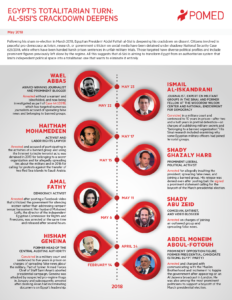 Egyptian voters approved (HT:Foreign Policy) constitutional changes, including an amendment that could permit President Abdel Fattah al-Sisi to stay in office through 2030.
Egyptian voters approved (HT:Foreign Policy) constitutional changes, including an amendment that could permit President Abdel Fattah al-Sisi to stay in office through 2030.
But opposition groups rejected the vote, The Washington Post reports.
“We do not recognize this outcome, resulting from a sham referendum, and consider it completely null and void, both formally and substantively,” a group of leading Egyptian opposition figures, most of them in exile, said in a statement Tuesday.” We believe that Egypt is now experiencing a state of constitutional crisis, after the regime destroyed any kind of legitimacy.”
Amy Hawthorne, research director at the Project on Middle East Democracy,* warned that “the constitutional amendments represent yet more seeds of instability for Egypt.”
Hassan Nafaa, a political science professor at Cairo University, said the results were expected. “There will be dangerous repercussion from the ruling regime as we will see more repression and restrictive policies,” he told AP.
While (former president Hosni) Mubarak allowed some dissenting voices and independent media outlets, Mr. el-Sisi has moved to block any hint of criticism. He has jailed tens of thousands of opponents, shuttered news media outlets and all but shoved the opposition out of politics. Last year, he won re-election with 97 percent of the vote after eliminating all other serious candidates months in advance, The NY Times adds.
 “It’s been true for several years now that the gains of 2011 have been lost,” said Michele Dunne, the director of the Middle East program at the Carnegie Endowment for International Peace (and National Endowment for Democracy.board member). “But I think that this just makes it more and more clear to people.”
“It’s been true for several years now that the gains of 2011 have been lost,” said Michele Dunne, the director of the Middle East program at the Carnegie Endowment for International Peace (and National Endowment for Democracy.board member). “But I think that this just makes it more and more clear to people.”
Many Egyptians and Sissi critics on social media disputed the voter turnout of 44 percent, The Post adds.
“This 44% turnout figure is absurd,” Timothy Kaldas, an analyst at the Washington-based Tahrir Institute for Middle East Policy, tweeted. “For perspective, in the 1st round of the presidential election in 2012 when people understood options & believed their votes mattered turnout was 46%. In this vote many didn’t understand amendments & had no faith their vote would impact.”
Opposition reemerging
 The fact that opposing votes were numerous enough that they could not be entirely ignored or denied highlighted an unintended consequence of Sisi’s constitutional gambit: Opposition has begun to reemerge despite nearly six years of grinding repression, adds Dunne and her Carnegie colleague Cassia Bardos:
The fact that opposing votes were numerous enough that they could not be entirely ignored or denied highlighted an unintended consequence of Sisi’s constitutional gambit: Opposition has begun to reemerge despite nearly six years of grinding repression, adds Dunne and her Carnegie colleague Cassia Bardos:
In January 2019, when the amendments were only rumors, more than a thousand Egyptians, including prominent public figures, signed a statement rejecting any changes that would allow Sisi to extend his term. The Civil Democratic Movement, a coalition that includes well-known figures such as former presidential candidates Hamdeen Sabbahi and Mohammed Anwar al-Sadat, was formed shortly after that to challenge the amendments. Denied a permit to demonstrate, members of the movement held a press conference and described the amendments as an “assault on democracy.”
There were reports during the referendum that some people were offered free rides to their local polling stations or given food parcels once they had voted, the BBC reports. An activist was also allegedly arrested for holding up a banner saying “No to the constitutional amendments” in the al-Tagamu al-Khamis area of New Cairo.
 Before and during the vote, the opposition was nowhere to be seen in the Egyptian news media. Opposition websites were blocked, and a scheduled protest against the amendments was canceled by the authorities, The Times adds.
Before and during the vote, the opposition was nowhere to be seen in the Egyptian news media. Opposition websites were blocked, and a scheduled protest against the amendments was canceled by the authorities, The Times adds.
“They don’t need to rig ballot boxes,” Timothy E. Kaldas, an analyst at the Washington-based Tahrir Institute for Middle East Policy, tweeted before the vote. “They rigged the entire media landscape.”
“Since 2013, the country has experienced the biggest authoritarian crackdown in its modern history, aimed at members of the peaceful opposition, both Islamist and secular. More than 60,000 people have been jailed for political reasons, and hundreds have died in prison,” Bahey eldin Hassan, the director of the Cairo Institute for Human Rights Studies, said in a recent opinion piece in The Washington Post (HT: NPR).
*A National Endowment for Democracy partner.







